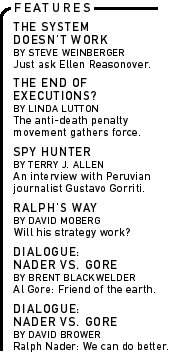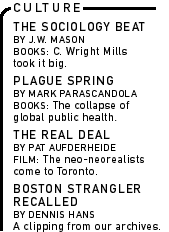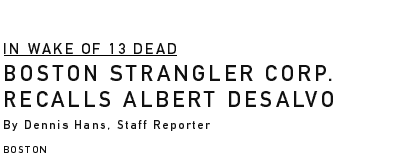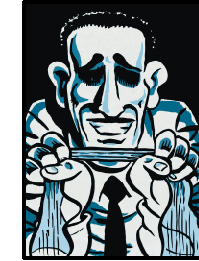
|

|

|

|
| |
Editor's Note: The In These Times staff historian recently
came across a remarkable story from our January 10, 1964 edition.
The original dispatch, with striking parallels to a current case
of a certain tire manufacturer, is reprinted below. |
|
|
Jan. 10--Bowing to public pressure, Boston Strangler Corporation CEO Albert DeSalvo announced yesterday a voluntary recall of himself. Investigators with the Massachusetts Trade Commission suspect a defective brain stem in BSC's one-man work force may have played a role in the murder and sexual assault of 13 women in the past two years. "At high levels of excitement, it seems his morals separate from his actions," said a regulator familiar with the case. If found liable, BSC faces fines of up to $250 per woman. "Our action today in no way implies an admission of guilt," said DeSalvo at a news
The recall marks the latest chapter in the short, tumultuous history of BSC. DeSalvo incorporated himself on June 11, 1960. He explained why on his "Application to Incorporate," which In These Times obtained from a Trade Commission insider. "Last winter I began to experience psychopathic urges which, if acted upon, could leave me exposed to our barbarous criminal justice system," he wrote. "If and when I flip, I figure to get a fairer shake from the corporate justice system." BSC first appeared on the public's radar screen in January 1963, when news reports listed it as one of a dozen suspects in the murder and sexual assault of four local women. Each of the women lived alone and was strangled with her own stockings. CEO DeSalvo denied involvement, but came across as insensitive when he suggested the victims themselves were to blame. "Any woman who opens her door to a complete stranger has an inflated sense of her own security," he told the press. Following the public outcry from that comment, he shifted the blame to the police, saying they had a "deflated sense" of just how dangerous the victims' neighborhoods were. In May 1963, after three more women had died under similar circumstances, DeSalvo launched a "charm offensive"--posing with his wife and children for local photographers and glad-handling passersby in Harvard Square. And he reached out to the victims' families. "I know it's not much," he told them, "but BSC will replace any nylons that sustained runs or blood stains in the strangling process." Unfortunately for BSC, the offer only fueled speculation of corporate culpability. Hoping to nip such talk in the bud, DeSalvo announced in July that an internal investigation found "no evidence" of complicity in the crimes. What he didn't say, and is revealed here for the first time, is that his investigation hadn't looked for evidence, focusing instead on how the pace of killings might affect the pool of future targets. The company's image slowly improved until October 1963, when two more women were found dead and DeSalvo labeled them "idiots." "For the sake of argument," he said, "let's assume BSC was on the premises. If a fellow knocks on your door at 2 a.m. and says he's with Boston Strangler, you don't have to be a rocket scientist to know he's not interested in a game of bridge." When apartment safety administrator Michael Raines heard that remark, he knew he had his corporation. "I immediately made plans to start an investigation some time in the new year," he said. "Certainly no later than spring." Now another four women are dead, and state senators are demanding answers from the trade commissioner as well as Raines. Meanwhile, the subject of all this fuss tries to maintain a positive
outlook. Says DeSalvo: "Some days I say to myself, 'Pay the stinking
fine, Albert, and get this ordeal behind you.' But as long as I
believe I'm innocent, even if only in some lawyerly technical sense,
I have to keep fighting. Not just for me, but for every other company
being strangled by regulators."
|


